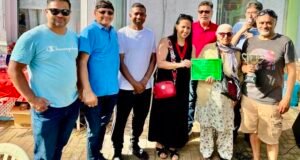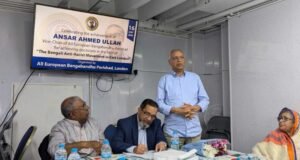
Tower Hamlets Council is supporting National Organ Donation Week which aims to increase family conversations around donation and encourage residents to register to become a donor, particularly those from the Black, Asian or Minority Ethnic (BAME) community.
Running from 3-9 September, the campaign aims to highlight the difference that organ donation can make.
NHS Blood and Transplant research shows that people from BAME populations are more likely to develop high blood pressure, diabetes and certain forms of hepatitis than white people. This makes them more likely to need a transplant.
John Biggs, Mayor of Tower Hamlets said:
‘’During national donor week we are encouraging everyone in Tower Hamlets to consider signing up to be an organ donor. When people donate they can save or improve up to nine lives.
“The most successful organ transplants come from those with the same ethnic background and this campaign is particularly reaching out to our BAME residents where there is currently a longer wait time to find a donor match ‘’
Although many black and Asian patients are able to receive a transplant from a white donor, a tissue-type match is best as they have a lower likelihood of being rejected.
Currently a BAME patient may wait 8-12 months longer for a kidney transplant than a white patient because of the lack of suitable donors. This puts them at increased risk of dying or becoming too unwell for intervention before receiving a transplant.
Cllr Denise Jones, lead for adults, health and wellbeing said: “The level of diabetes in the Bangladeshi population in Tower Hamlets is significantly higher (8-10%) than Caucassion (x%).
Poorly managed diabetes can often lead to kidney failure so we are urging people to start these conversations with their families and register today.”
It is estimated that 16% of deaths in adults in Tower Hamlets are attributable to diabetes compared to 12% nationally.
Surma’s story
Surma’s daughter was born with nephrotic syndrome, which meant there were tiny holes in her daughter’s kidneys, leaking protein and making her ill.
A young mum herself, Surma faced weeks of worry as doctors struggled to diagnose the problem. She said: “We had no idea what was wrong and I ended up in A&E with Fatima as she was violently ill. She was in hospital for nine months. Every couple of days she had have an infusion, it really was touch and go. Even when she was allowed home we were constantly rushing back to the hospital because she had become breathless or poorly again.”
Two years later Surma gave birth to her second daughter, Aisha, who was also sadly born with the same kidney condition. It turned out that Surma and her husband were unwitting carriers of a gene which causes nephrotic syndrome. Fatima had a transplant before she was ten and Aisha in her teens had a kidney transplant. However, Aisha’s failed after four years and she is back waiting for a further transplant. Her wait is made all the more complicated by the shortage of donors from black, Asian and minority ethnic communities (BAME). People from those communities are at five times a greater risk of getting kidney disease than white people.
Surma now works with Kidney Research UK as a Peer Educator, encouraging community members to talk to their peers about the risks of kidney disease, how to look after themselves and about organ donation.
 Weekly Bangla Mirror | Bangla Mirror, Bangladeshi news in UK, bangla mirror news
Weekly Bangla Mirror | Bangla Mirror, Bangladeshi news in UK, bangla mirror news






